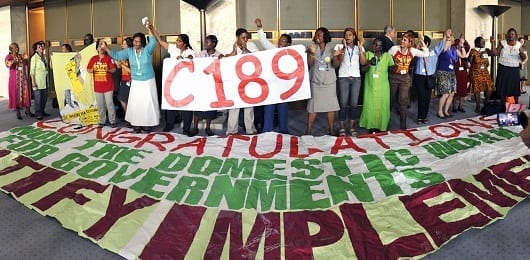There is some good news for domestic workers in Kuwait: The National Assembly adopted a new law in June that will grant them unprecedented legal rights. The law applies to family maids, baby sitters, cooks and drivers.
More than 660,000 domestic workers are currently employed in Kuwait, most of them migrant workers from Asia and Africa. Human Rights Watch researcher Rothna Begum says this is a “major step forward” for Kuwait because for the first time it provides domestic workers with “enforceable labor rights.”
“Now those rights need to be made a reality,” she says, “and other Gulf states should follow Kuwait’s lead.”
Under the law, which brings Kuwait closer to compliance with internationally recognized labor standards, employers must grant domestic workers a maximum 12-hour workday with one day off per week and 30 days paid leave per year. The law also establishes a minimum wage of 45 Kuwaiti Dinar (around $150), guarantees end-of-service benefits—one month’s wage for every year worked—and bans employing domestic workers who are below age 20 or more than 50 years of age.
The National Assembly also voted to establish a shareholding company for recruiting domestic workers. The company would replace more than 300 independent offices, streamlining the recruitment process and limiting potential abuse of domestic workers. The assembly also voted to create Kuwait’s first National Human Rights Commission.
Begum, however, pointed out that some legal gaps remain. For example, it is not yet clear how the law will be enforced, and domestic workers still are not allowed to join unions to protect their rights.
Abdulrahman al-Ghanim, a migrant worker advocate at the Kuwait Trade Union Federation (KTUF), says the law should only be the beginning. Migrant workers especially are in need of further protection, he says. In Kuwait and other Gulf countries, the current Kafala system—in which recruitment agencies sponsor migrant visas—makes it easy for employers to abuse domestic workers and then charges workers as criminals when they try to escape. Kafala is “a system of slavery,” he says.
“The new legislation is a start,” says Begum, pointing out that the law still does not match the standards for domestic workers established by the International Labor Organization (ILO). “Kuwait should continue improving protections for domestic workers,” she says.

